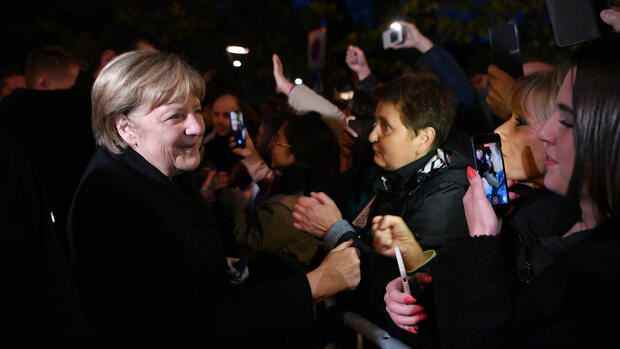Beaune Angela Merkel’s limousine rolls over the cobblestones in Beaune, a small medieval town in the French wine region of Burgundy. Your host has been there a little longer: Emmanuel Macron has already talked to citizens who are crowding behind the barriers. For Merkel, the trip is a farewell visit. The fight for re-election begins for the French President.
People cheered when Merkel got out late on Wednesday afternoon and took Macron for a walk through the streets of Beaune. “Welcome to Burgundy, mom,” calls out a man. A resident blasts the chancellor and her entourage from an open window with the European anthem, “Joy of beautiful spark of gods”. “It’s wonderful that so many people have come,” says Merkel.
The outgoing Chancellor had a rather sober view of Franco-German relations – and she leaves behind a number of unresolved questions in bilateral relations that Macron will have to clarify with the future federal government. But at the end of her term in office, Merkel is more popular than ever in the neighboring country: According to a survey by the Ipsos opinion research institute, 75 percent of the French have a positive opinion of her.
In retrospect, the Chancellor appears to many French as a guarantor of stability and a successful crisis manager. Macron also drew this picture when he presented Merkel with the Grand Cross of the Legion of Honor, the highest honor in France, a few hours after the tour in Beaune. “Since you became Chancellor, France has come to know and love you,” said the President. “In all these years you have helped to hold Europe together despite all the shocks.”
Top jobs of the day
Find the best jobs now and
be notified by email.
Merkel’s Franco-German balance sheet is, however, more complicated. “There were ups and downs,” says Éric-Andre Martin from the Paris think tank Institut Français des Relations Internationales (Ifri). It usually became difficult when the EU was about money.
Four presidents during Merkel’s tenure
During Merkel’s 16 years in the Chancellery, four presidents ruled France. At the end of his term in office, she was unable to build up a close relationship with Jacques Chirac. There were also initial difficulties in dealing with Nicolas Sarkozy before she formed the political duo “Merkozy” with him during the euro crisis.
The socialist François Hollande then tried to distance himself from Merkel in European financial policy, but could not prevail. At the same time, Hollande never forgot her support for the Chancellor after the Islamist terrorist attacks in Paris in November 2015.
It also took Macron and Merkel some time to find each other. When the newly elected President submitted a series of reform proposals for the EU in his Sorbonne speech in 2017, he waited in Berlin for a long time in vain for an answer. Macron’s political approach lives from visionary goals, says Ifri expert Martin. Merkel ruled “step by step, from obstacle to obstacle”.
Nevertheless, in recent years a close bond has developed between the now executive chancellor and the current French head of state. With the Treaty of Aachen 2019, they created a new basis for Franco-German cooperation. Macron lifted Merkel’s confidante Ursula von der Leyen to the head of the EU Commission. In the corona crisis, Germany and France agreed on the European reconstruction fund, which for the first time provides for joint borrowing.
“The nice thing, regardless of which president I worked with, was always that we come from the same set of values, but our first thoughts usually have a different thought,” said Merkel when Macron awarded her the Legion of Honor. “And that in one way or another it has always been possible to bring these thoughts together.”
Reform of the euro debt rules still open
However, some of the different ideas could not really be combined under Merkel: The Chancellor, for example, was not able to gain much from Macron’s demand for more European autonomy in security policy. “Even if Merkel said that Europe had to take its fate more into its own hands, she did not follow words with deeds,” says Martin. Another construction site that Merkel is leaving behind her likely successor Olaf Scholz is the reform of the euro debt rules requested by Paris.
However, these issues should no longer play a role in Merkel’s adieu. From the Élysée Palace, it was said that Macron had wanted a personal setting, away from the capital Paris and without any explanations of political topicality.
For the evening ceremony, the President chose a château surrounded by vines. Afterwards Merkel and Macron retired with their spouses to a private dinner, a star chef served poached eggs in red wine sauce and braised beef.
More: France’s bet on nuclear power poses a major problem for the next federal government
